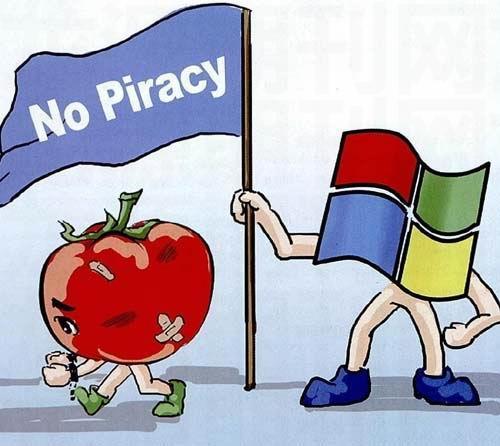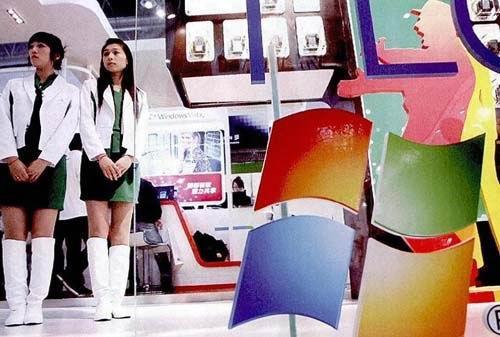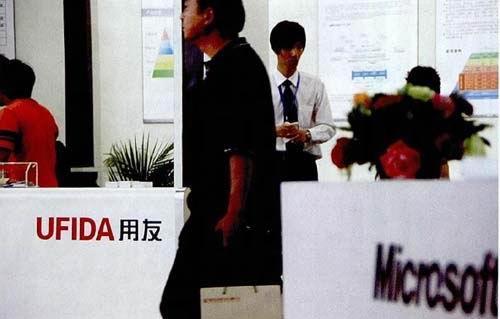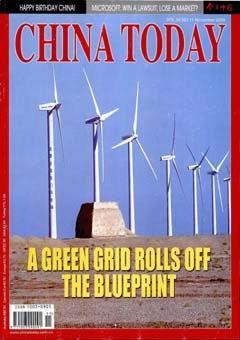Microsoft:Win a Lawsuit, Lose a Market?
By staff reporter LU RUCAI



AN intellectual property dispute between Microsoft and Chinese entrepreneurs has been resolved in the American giants favor, landing two men with heavy fines and jail time for spreading “the tomato edition” of Windows XP.
On August 20, 2009, the Huqiu District Peoples Court of Suzhou City, Jiangsu Province in Chinas coastal area made a court decision regarding infringements made by tomatolei.com on Microsofts Windows XP intellectual property rights. Hong Lei, maker of the pirated edition of the famous operating system, together with Sun Xianzhong, general manager of the Chengdu Gongruan Internet Technology Company, were each sentenced to three and half years in prison and personally fined RMB one million. Their company, Chengdu Gongruan Internet Technology, was fined an additional RMB 8.77 million, along with having earnings of RMB 2.92 million from sales of its pirated edition confiscated by the court.
Microsoft Corporation hailed the Chinese courts decision as a “l(fā)egal milestone.”
Any Publicity, They Say, Is Good Publicty
The courts decision was met with a flurry of Internet activity, not only because this was the first anti-piracy case that Microsoft ever filed in a Chinese court, but also due to the large number of Internet users who had used, or were still using, the pirated edition from tomatolei.com. To them, this pirated edition, or “the tomato edition” as it is affectionately known, is thought to have improved user-friendliness over the original.
According to an on-line survey conducted by www.sina.com.cn immediately following the court decision, at least 50,000 of the 180,000 netizens polled claimed to be using the “tomato edition” of Windows XP.
Investigations conducted by the court showed that the “tomato edition” had been downloaded free from the Internet over 200,000 times. Some experts estimate that the installation figure for the edition quite possibly exceeds 10 million.
We spoke to Mr. Wang, a small business employee who admits to using the “tomato edition.”“The pirated edition was free of excessive and unnecessary functions that slowed down the original,” he explained, “and was packaged with other frequently used software – very convenient for computer novices. To some users in China, the word ‘free is magic and irresistible.” In addition to streamlining the softwares functions, Hong Leis “tomato edition” eliminated the verification and registration procedures imposed on Microsoft customers.
If, Mr. Wang continued, this “revised edition” had left options for the personalization of pop-up control and search engine tools, the number of users might have doubled. To Tomatolei, their business model was based on revenue from ad sales rather than sales to users. The evidence collected by the court contained a long list of advertisers, including Baidu, the largest Chinese-language search engine, and Alibaba, another Chinese web giant in B2B business services.
A large number of netizens expressed sympathy for Hong Lei. Many went so far as to call him a “national hero.” One “tomato edition” user called on other users “to help Hong Lei out by donating RMB 10 each to pay that daunting fine.”
“The fine for the ‘tomato edition is a large sum for a Chinese company,” Liu Fengming, vice president of Microsofts Greater China Region, commented to the press. “The problem is, people regard Hong Lei as a genius and national hero.”
Microsofts Reversal of
Fortune
After the court decision was made, Liu Fengming pronounced his gratitude toward Chinas law enforcement and the Business Software Alliance (BSA).To him, the court decision represented the Chinese governments new uncompromising attitude toward any infringements on intellectual property rights.
Microsoft owed a large part of its victory to a national movement against infringements on intellectual property rights on the Internet, a move that began in June 2008, when the BSA, on behalf of Microsoft, filed a complaint with Chinas National Copyright Administration and the Ministry of Public Security against tomatolei.com, targeting the “tomato edition.”
In a reversal of fortune, Microsoft won the case but lost public sympathy on the Internet. Apart from numerous netizens who tapped away in disapproval, there were also many professionals who let it be known they viewed Microsofts behavior in China as monopolistic.
Back on August 1, 2008, when Chinas anti-monopoly law took effect, there was wide speculation that Microsoft would become the first target.Instead, 14 days later on August 15, the police arrested Hong Lei, creator of the “tomato edition.” To some, this was really an “ingenious move on the part of Microsoft to deflect Chinas anti-monopoly measures.”
The governments inaction on Microsofts monopoly left many disappointed.Netizens complain that Microsoft is free to make its way in China despite being penalized for exercising a monopoly in other countries.
Ya-Qin Zhang, chairman of Microsoft China, made the following remarks after the court decision, “Most of the Microsoft products found in China are illegal copies. Therefore, a Microsoft monopoly doesnt exist in China.” Yet Microsoft has never disclosed the actual percentage of its legal products on the Chinese market.
To some people in the software industry, Microsoft gained much more than itlost out of its pirated copies. Liu Chunquan, a lawyer from Shanghai Office of the Beijing Guangsheng Law Firm, put it this way: “This lawsuit exemplifies Microsofts successful execution of a very tactful strategy in China, a strategy that could be described as “feeding the fish before netting them.” “During the past decade or so,” he said, “Chinas colleges, middle and primary schools and government departments have served as promoters of Microsoft products. Only when numerous Chinese computer users were in the habit of using Microsofts Windows Operating System, did the company begin to ‘safeguard its rights.” To Liu and many others, this amounted to “dismantling the bridge after crossing the river.”
This was not the first time Microsoft lost the publics respect in China. Its famous “black screen move” was also aimed at the enforcement of legal ownership: regular software updates transmitted threats that any computer with a pirated version of Windows XP installed would suffer a “blackout” of its screen.

